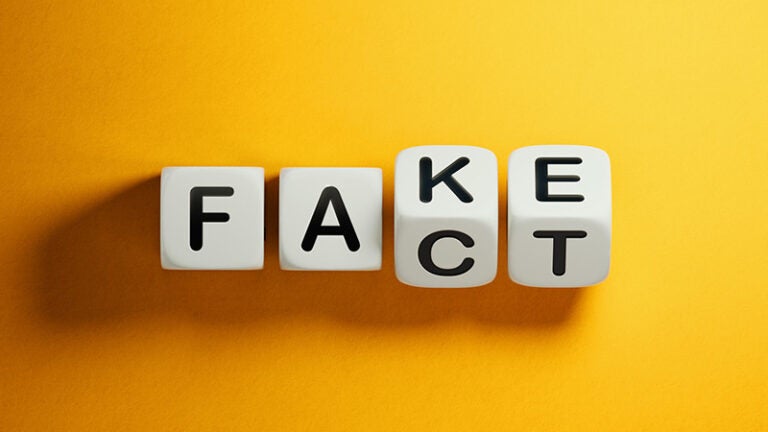
Stopping the spread of fake news, one class at a time
The idea of dedicating a semester-long course to teach students how to sort through fake news used to be unthinkable — until investigations in the aftermath of the 2016 election revealed that Russians had tried to meddle with voters by spreading fake stories across social media.
The growing awareness that fake news, misinformation and outright lies are now everywhere so disturbed Julien Emile-Geay, associate professor of Earth sciences at USC Dornsife College of Letters, Arts and Sciences, that he thought it was time to teach future generations how to defend themselves against those tactics.
One quote was foremost in his mind as he wrote the syllabus for a Spring 2019 course: “There are three types of lies — lies, damn lies, and statistics.” The quote, often attributed to former British Prime Minister Benjamin Disraeli, inspired the name of Emile-Geay’s GEOL 145 course, “Lies, Damn Lies, and Statistics.” Although some students are turned off by required courses such as general education requirements, Emile-Geay said he set out to combine “sour-tasting math and coding into a culturally-relevant package.”
Students finished the course feeling empowered.
“I went to the first lecture, not sure if I wanted to stay in the class, but I was really sold because I think it’s a really hot topic that we haven’t been adequately prepared to combat in our adult lives,” said Katie Thanos, a USC Dornsife junior majoring in law, history and culture. “I’m glad that we’ll be graduating from USC with the knowledge that not all data were created equal.”
Thanos’s takeaway is exactly Emile-Geay’s objective. As a leading climate scientist whose work helped confirm the dreaded “hockey stick” pattern that shows a significant spike in global warming, Emile-Geay is worried about the public’s distrust in science and scientists. He especially worries that the rise in fake news sharing across social media sites and other outlets is a troubling sign for the future of democracy.
Emile-Geay said his course would help students get to the truth on all manner of quantitative claims, from estimates about the size of a crowd to various hot-button scientific issues — climate change, vaccination and the health effects of tobacco and sugar.
“The recent revival of populism made me realize that one of the most essential skills we could teach our students is to develop a well-calibrated ‘lie detector,’” he said.
By teaching students some statistics, data analysis psychology, epidemiology, coding, and climate science, Emile-Geay gave students the power to become better judges of information. They could weigh the truth of information not just based on their gut instinct, but based on a range of evidence, from assessing the credibility of a source, to analyzing graphs or understanding statistical jargon. Although many of the 18 students complained about coding in the course lecture, and somewhat about the statistics lessons, they largely praised Emile-Geay for offering and leading it.
Austyn Rich, a senior who majored in dance at USC Glorya Kaufman School of Dance, said that for him, Emile-Geay helped him understand the underlying politics of not just climate change, but even public health issues, such as vaccination. Rich said the class has challenged his own beliefs and interpretation of information.
“As a result of this course, I’m now able to kind of re-evaluate where I stood before on an issue,” said Rich, who graduated in May.
Emile-Geay knows that a general education course in quantitative reasoning is not most students’ idea of fun.
“If there is one thing you should learn in college, it is to not get bamboozled by a misleading graphic,” Emile-Geay said. “To me, statistics are as important as eating your greens: Except for a few fanatics, nobody wants to do it, but over time, you realize it’s good for you.”
He said he will teach the course again in Spring 2020, and will continue refining the content.
“Whether to vaccinate children, whether fossil fuels promote life-threatening climate change, whether sugar promotes cardio-vascular diseases … these literally are life-or-death judgments; they cannot be left to chance or prejudice,” Emile-Geay said.